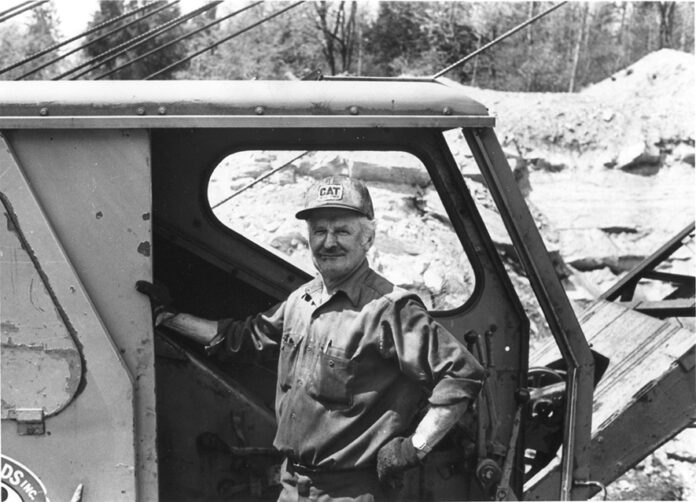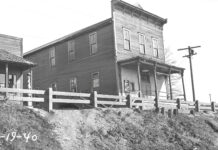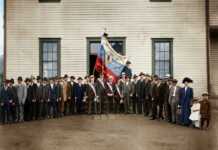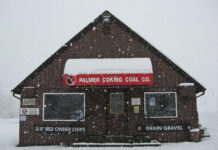In this 1977 photo on Franklin Hill, east of Black Diamond, Jack Kombol stands beside the dragline he operated for Palmer Coking Coal (Palmer) at the McKay-Section 18 surface coal mine. The Koehring 405 had an excavating shovel bucket to move overburden and extract coal. The light-colored rock in the background was the sandstone bedrock laying above and below the McKay coal seam that tilted at about 45 degrees to the surface. This photo comes courtesy of Lou Corsaletti, who authored several articles about the coal industry in southeast King County.
After closing the last underground coal mine in Washington, Palmer began surface mining this seam to supply Washington State with fuel to heat institutions like the Shelton Correction Center and Monroe Reformatory.
Jack Kombol was born at his family’s rental home in the tiny and short-lived town of Hiawatha. The homes were provided by Northwest Improvement Company (NWI) to house workers at their Hiawatha coal mine located midway between Kanaskat and Kangley. The mine was designed to replace the Ravensdale Mine, whose Nov. 16, 1915 explosion claimed the lives of 31 miners. Jack’s father, Tony Kombol, worked at the Ravensdale mine but was sent home early that dreadful Tuesday. Like many unemployed coal miners, Tony Kombol left Ravensdale and found work in Arizona and Montana copper mines. Jack’s mother, Lulu (Shircliff) Kombol, was a Ravensdale school teacher who similarly lost her job.
The growing Kombol family returned to Washington in early 1919, when Tony rejoined NWI at their new Hiawatha mine. However, the mine was riddled with problems and dangers. Two miners, Joseph Ripoli, Italian, and John Panotas, Greek, suffered fatal accidents during the mine’s brief five-year history that produced meager amounts of coal. Tony Kombol, who at age 17 immigrated to the U.S. from Croatia in 1902, soon found work at the nearby Parkin Kangley Coal Company mine. It was located less than a mile north of the Hiawatha home that the family of seven continued to rent from NWI.
On August 7, 1925, Tony Kombol was severely disabled when an errant dynamite explosion blinded him at the Parkin Kangley mine. He spent 30 days in the hospital but couldn’t return to work due to a full disability for which he received a $40 monthly pension plus a $35 monthly stipend for five children, all under the age of 10. Lulu Kombol returned to work as a school teacher in Selleck and Cumberland to support the family.
A year or so later his second son, and fourth child, Jack contracted polio at age six or seven with a forced absence from school that lasted nearly two years. After recovering, one of Jack’s legs was shorter than the other. He attended Selleck school through the 8th grade then went to Enumclaw High School. Being two years older than fellow students and not particularly academic, he dropped out during his junior year.
Because of a polio-shortened leg, Jack was unfit for service during World War II and moved to Seattle where he drove garbage, tanker, and tow trucks. After the war he primarily worked in the woods where he drove log trucks and operated equipment for his brother’s logging company, Bernell Kombol & D.L. Holcomb, and at his cousin-in-law’s firm, Woodrow Gauthier of Gauthier Brothers Lumber and Logging.
Kombol found a new logging job in Northern California and relocated there in early 1950. Pauline Morris, an Enumclaw girl whose father and uncles owned Palmer Coking Coal, soon followed. The couple married in Crescent City later that year. Jack joined Palmer in 1952 and worked for the company until his death in April 1979 at age 57.
Jack and Pauline’s son, Bill Kombol began writing “When Coal Was King” in May 2007. The position evolved after his youngest son’s Cub Scout troop visited the Maple Valley newspaper, VOICE of the Valley. There, Bill learned that the publisher had recently lost a columnist and volunteered for the job. And the rest, as they say, is History.







